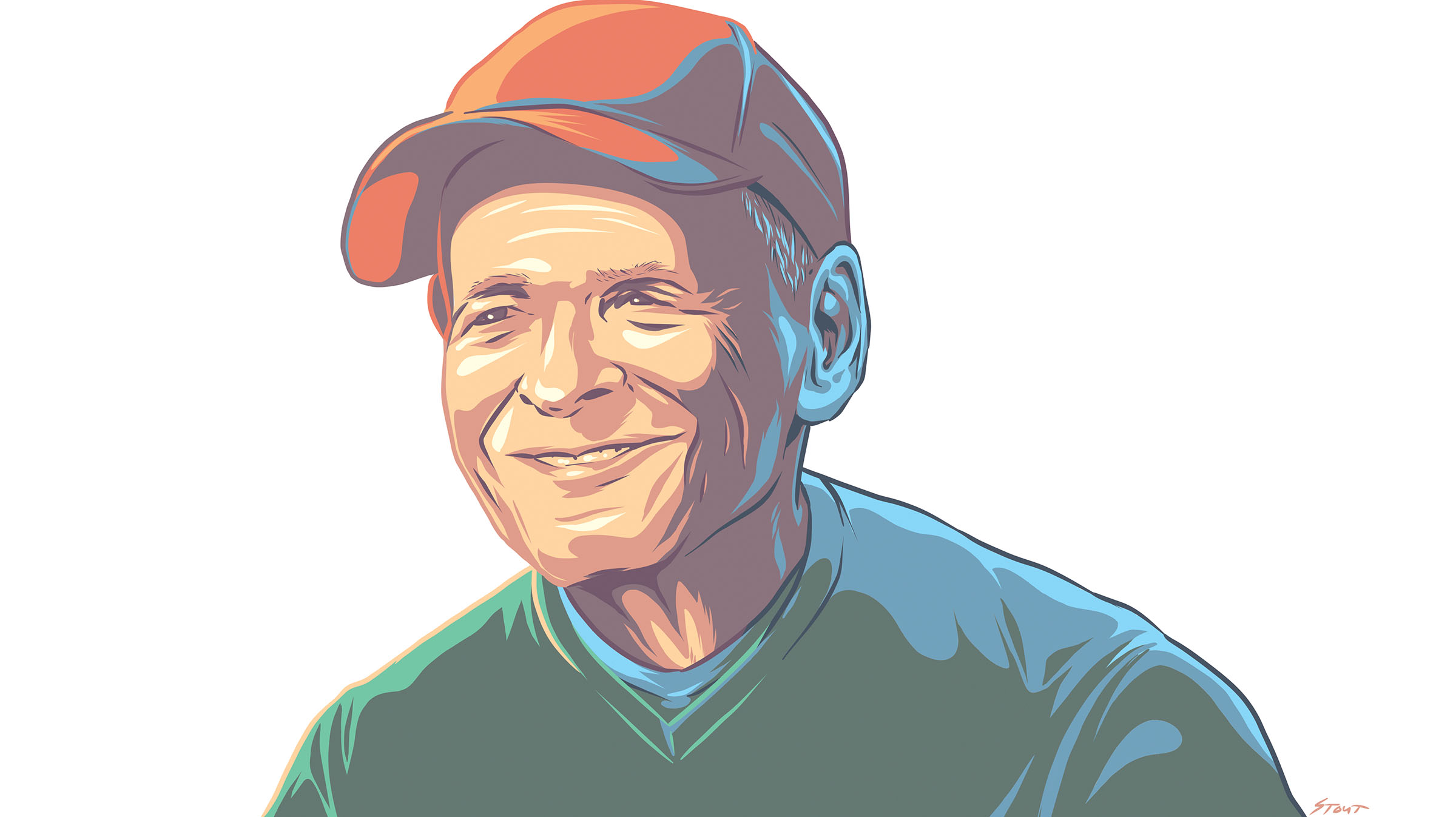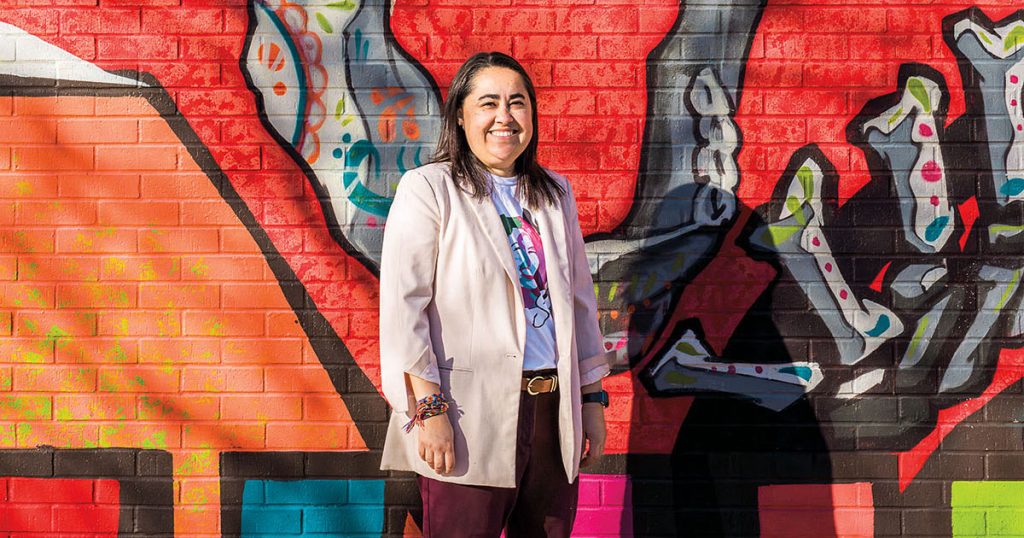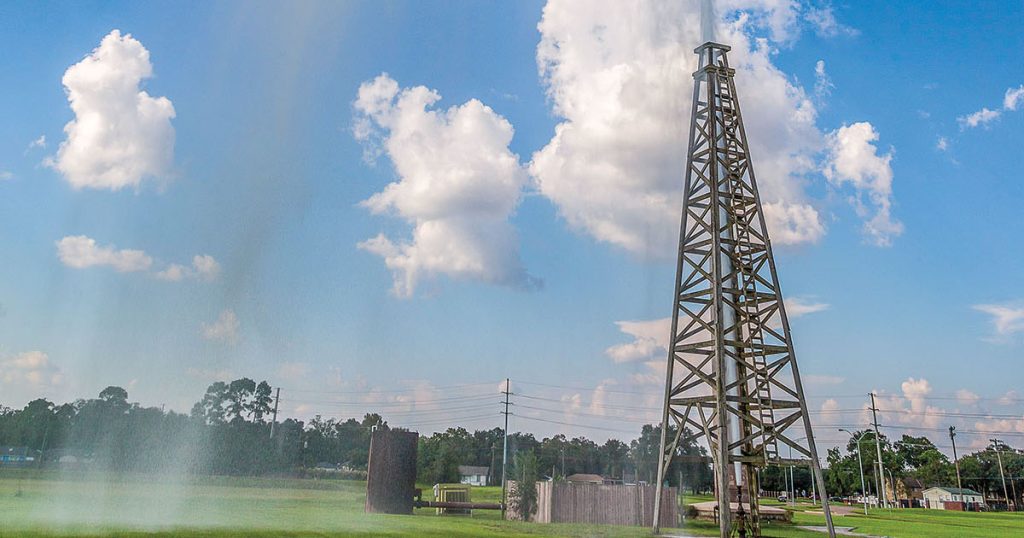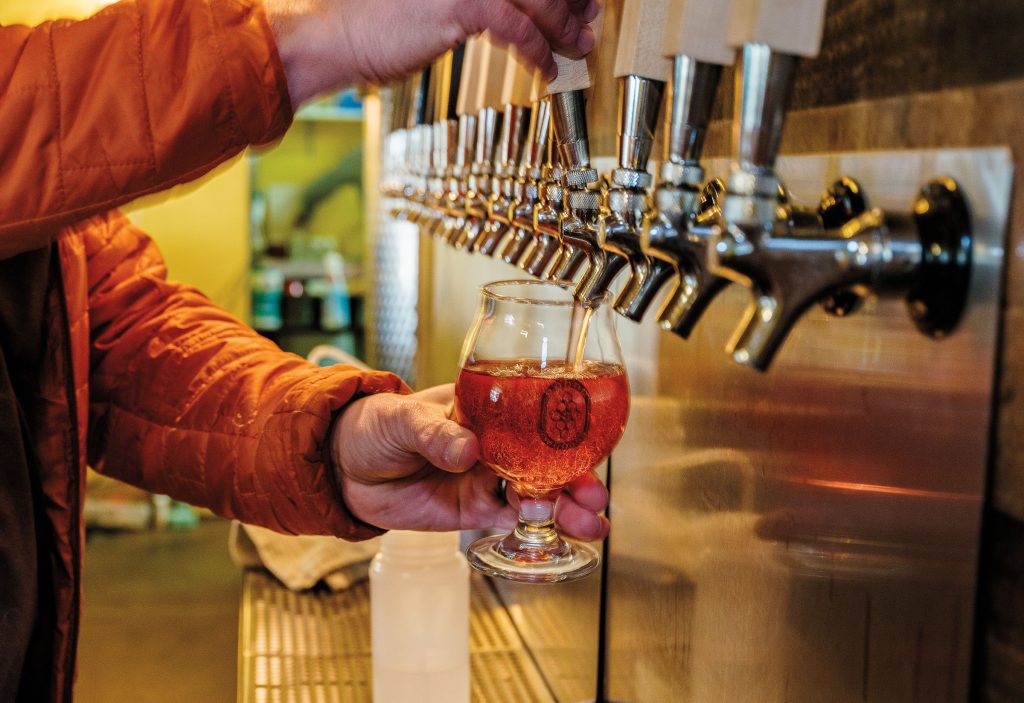
Illustration by Jason Stout
Acclaimed author Tim O’Brien made his highly anticipated return with his first novel in 20 years, America Fantastica, last October. The rollicking satire follows chameleon-like protagonist Boyd Halverson and his road trip sidekick, Angie Bing, a born-again Christian intent on saving Boyd’s soul. The high-speed, high-wire narrative begins with Boyd’s decision to rob a bank in the fictional town of Fulda, California, and then to kidnap Angie, who works as a teller there. “Hunter S. Thompson meets Sacha Baron Cohen,” praised Publishers Weekly in a starred review. This new book is a significant departure from O’Brien’s 1990 novel-in-stories classic, The Things They Carried, a series of fictional portraits of American soldiers fighting in the jungle of Vietnam and their lives upon returning to the states. America Fantastica revolves on the axis of moral consciousness—a tug of war between reality and a madcap existence made up of lies.
Originally from the small town of Austin, Minnesota, O’Brien was drafted into the U.S. Army, where he served for two years in the Americal Division during the Vietnam War before attending graduate school in government studies at Harvard University. For the past 24 years, O’Brien has made his home in Austin, Texas, with his wife and two sons. “In my neighborhood, people don’t even know I’m a writer, much less what I’ve written,” O’Brien says. “It still feels like living in a foreign country. We talk about hamburgers, barbecue, anything related to Texas.” O’Brien’s earlier novels have earned top literary honors. Going After Cacciato won the National Book Award for fiction in 1979, while The Things They Carried was a finalist for the Pulitzer Prize. For two decades, O’Brien has taught in the MFA writing program at Texas State University in San Marcos. Now 77, the author and amateur magician claims America Fantastica will be his last book.
TH: What was the inspiration for America Fantastica?
TO: I took about 20 years off from writing. Before I stopped, I had written about Angie Bing in about 10 pages when Boyd comes in to rob the bank and their trip down to Mexico. I had fallen in love with her character. She has such a contradictory set of values and opinions about the world. For the next 20 years, she was talking to me, “Put me in a book. Write the sentences.” It wasn’t until 2016, somewhere in there—when Trump was elected—that I really had a story for the rest of the book.
TH: One could call it a road trip novel.
TO: And some of it happens in Texas. The characters drive into Kerrville, down to Port Aransas, and then out of Texas. I had fun with that area of Texas along the Gulf. It’s filled with RVs going like 3 miles per hour, parades of people and cars, and the oppressive heat.
TH: With the early days of COVID and the tumultuous times of 2020 and 2021, lies were a part of the mainstream dialogue. Does today’s political climate feel similar to the Vietnam War era?
TO: It seems more pervasive now, but lying was happening back then, too. The body counts were being lied about. Government and the military told us we were winning the war for years when the CIA itself was saying we aren’t winning. The secret bombing of Cambodia. Lying is probably as old as Babylon, as I write in the opening of the novel. It’s always been with us, but it seems to be with us on a more regular daily basis.
TH: What do you hope readers take away from the novel after they finish it?
TO: It’s sort of like Jonathan Swift or Mark Twain. If you can’t beat them with reason, there is always the opportunity to laugh. There is something for making tragedy entertaining. Shakespeare did it. Lots of other great writers have done it. You can’t earnestly talk anyone out of what they believe. So, laughter is one kind of good medicine for the heart.
TH: What other books is your novel in conversation with?
TO: Hunter S. Thompson, for example, who had kind of a similar response to the Nixon years. He wrote about it in Fear and Loathing on the Campaign Trail. He was simultaneously funny and scathing. One of the epigraphs from my book is from Hunter S. Thompson: “We are not a nation of truth lovers.” And that was written in 1968. A long time ago. What he was doing in New Journalism was—I don’t want to say it was an influence, but it was an inspiration.
TH: Who’s your favorite Texas writer?
TO: Cormac McCarthy. I love No Country for Old Men and All the Pretty Horses. I adored The Road. It’s a short novel, but it’s so moving, scary, and beautifully written.
TH: The Things They Carried is widely read and taught, and it has sold 6 million copies. What has it been like for your book to become a classic?
TO: Every writer wants to be read. The most amazing thing is how college and high school students read the book and really like it, and how many people of that age say, “I wasn’t a reader until I read that book—and now I am.” Well, it’s a weird book because it’s about war and they’ve never been to war. Something else is appealing to them. I’m not sure what it is. Maybe it’s a curiosity about violence and warfare, maybe about another era—the ’60s.
With adults, there is a similar kind of reaction of how much the book meant to them. Usually, it comes from people who have suffered tragedies in their lives and are recuperating—the death of a husband, the death of a father. They take a war experience and translate it into their own kind of tragedy. Tragedy comes in different shapes and forms.
TH: Have you taken a lot of road trips in Texas?
TO: Yeah, I’ve driven down to the Gulf. It’s a mixture of Mobile, Alabama, and parts of Florida. It’s more beachy southern than I would have expected. By that I mean the temperature, the air. It has a numbing effect on me. My brain cells start to decompress and fill up with humidity.
I also find East Texas interesting—that Louisiana border, the eastern part of the state. I like crawfish, the food, the Cajun influence. I like how it feels like it’s back in another century. When you’re on backroads in East Texas, you are in 1930s or 1830s Texas. And West Texas, with those barren empty roads going forever and forever.
TH: Are you still doing magic shows?
TO: Not shows. It takes almost a year of practice. I do it with six or eight friends of mine. And then, it’s about practicing over and over again in order to protect yourself against angles. Seven hours, twice a week, we would meet for eight months. It was exhausting. My house looked like a casino with magic tricks, decorations, and so on. But I still practice personally.
TH: What attracted you to magic?
TO: Probably the same thing that drew me to writing novels—building an illusion of things that are happening but aren’t happening. Angie Bing and Boyd don’t exist, and their road trip didn’t. The illusion of it is tantalizing and tempting. I lose myself in the novel in the same way that I lose myself in magic.
Tim O’Brien will appear at the San Antonio Book Festival April 13.
sabookfestival.org








